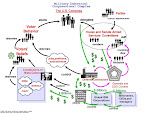The only fair tax system is a net income tax based on progressively higher rates on high income ---and VERY high rates on very high incomes.
We are living in a mature, post-industrial economy with extensive telecom and computing. This is mostly a state-managed economy, in which the state-managed sectors capture the economic surplus of even the unincorporated sectors.
The dynamics of this economy are NOT the same as Thomas Jefferson, Karl Marx. Economies of scale alone, demolished competition in many industries. Those industries collapsed disastrously into monopoly, a situation only barely restrained by antitrust laws to oligopoly in most industries.
We find that a principle of concentrated benefit and distributed costs (the special interest problem) afflicts ALL large organizations whether political, economic. Those with the most at stake work hardest to influence decision processes, while it is uneconomic and essentially impossible for the affected population to participate in every decisions.
The behavior of corporate executives and boards is one of the more visible examples of this law in action. They seize unearned wealth from customers, suppliers, workers and the community, by the power they exercise.
We find externality costs to be almost universal in a market economy system based on private contract. Although the magnitude varies greatly, the aggregate of all the externalities is quite material, surpassing the value of the measured economy.
We are finding that information economics make it impossible for meaningful competition in many markets, from presidential choices to branded online services. The concentration of power provides resources necessary for better decision support by the largest actors and first movers. First mover advantage allows firms such as ebay in the auction domain to capture nearly their entire market. Game theoretic actions, guided by OODA analysis, change facts on the ground in ways the opponent cannot overcome.
These problems are mitigated by a progressive income tax in two ways. First, it provides the economic resources necessary to redress inequity of unearned wealth stolen from society by the powerful. Second, by reducing the extreme rewards available from antisocial behavior, it disincents that behavior in the first place.
Of course there are direct measures that mitigate externalities- but until the structure of markets and contract law are changed in much more fundamental ways, progressive income tax is about the only way to prevent the largest companies and most game theoretic people in the marketplace from progressively capturing the entire economic surplus of society.
Subscribe to:
Post Comments (Atom)

No comments:
Post a Comment